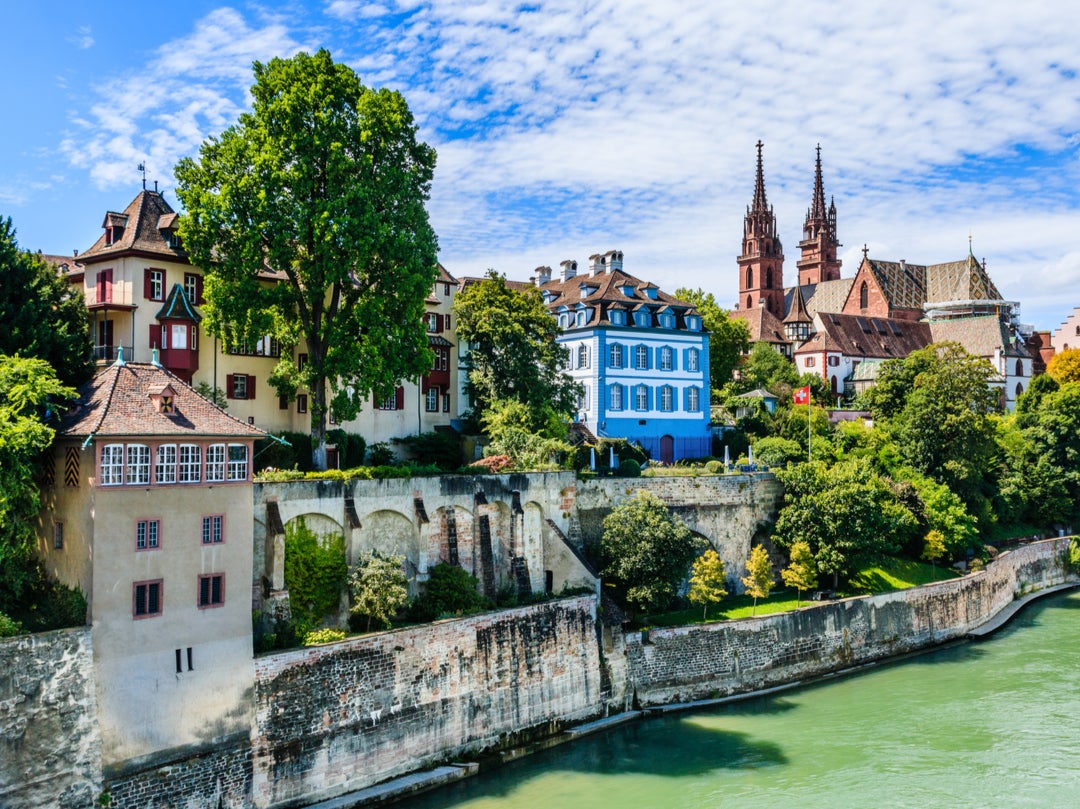Where on the green list can you actually go on holiday?
The green list has been updated – but British holidaymakers aren’t welcome everywhere

Canada, Denmark, Finland, Switzerland, Lithuania, Liechtenstein and the Azores have all been added to the UK’s green list in the latest review of the government’s traffic light system for international travel.
The transport secretary, Grant Shapps, announced the updated lists in the Department for Transport’s latest reshuffle on 26 August, a day later than expected.
All seven of these destinations went straight to green, rather than the green watchlist, which indicates when a country or territory is at risk of being downgraded to amber.
There are now 43 destinations in total that have green status, with returning travellers facing the lightest restrictions on entry to the UK, regardless of vaccination status – just one pre-departure lateral flow test and one day two post-arrival PCR test, with no need to quarantine if the results are negative.
However, a number of places on the green list are still not welcoming British travellers.
Canada, for example, may have been given the thumbs up from our side of the Atlantic, but is largely closed to international holidaymakers until 7 September, when fully vaccinated travellers meeting their criteria will be allowed in.
Here are some of the key green list tourist destinations that are open to UK tourists at the moment – under certain conditions.
Barbados
This island nation in the eastern Caribbean provides all the white-sand beach credentials that summer holiday dreams are made of.
All travellers from the UK must present negative PCR test result on arrival taken no more than three days in advance.
Unvaccinated travellers must quarantine at a designated hotel, but fully vaccinated arrivals from the UK undergo a rapid PCR test either at the airport or at government-approved accommodation. You will need to remain on the premises of your accommodation and follow the quarantine rules until you receive the results of your second test, usually within 24 hours - and if the result of that second test is negative, you’re not subject to further quarantine.
Croatia
From the magical walled city of Dubrovnik, to the turquoise waters of the Adriatic Sea, Croatia ticks a lot of boxes for an ideal summer holiday.
Director of the Croatian National Tourist Board Kristjan Staničić described the destination as “the very top of the safest and most desirable tourist destinations in the Mediterranean”.
Find inspiration in our guide to Zadar and guide to Zagreb.
To be allowed entry into Croatia, all travellers from the UK regardless of their vaccination status must present either a negative COVID-19 antigen test, which must not be older than 48 hours, or a negative PCR test, no older than 72 hours on arrival.
Children under 12 and accompanied by a parent/guardian are exempt from the requirement to present a negative test result, and to self-isolate, if the parent or guardian has one of the documents set out above.
Denmark
From trendy capital Copenhagen to island hopping across Bornholm and Samso, Denmark is more than a one-trick pony when it comes to attractions.
Although Brits who aren’t double-jabbed need a “worthy purpose” to enter Denmark, fully vaccinated UK residents or those previously infected with Covid-19 can come and go for any reason - with the added bonus of not needing to self-isolate. Two weeks must have passed since your second dose and the vaccine must be one approved by the European Medicines Agency. You must present proof that you have been fully vaccinated or previously infected.
Finland
Whether you’re looking for a city break in Helsinki or Tampere or fancy hitting up one of its various ski resorts once the season hits, oft-overlooked Finland is worth considering.
If you are travelling to Finland from the UK, you will need: proof of being fully vaccinated at least 14 days prior to arrival; or a certificate of recovery from within the past six months.
Germany
Germany has plenty to keep visitors occupied, from its big-hitting cities of Berlin, Hamburg Munich and Cologne, to its picturesque Black Forest region.
From 7 July, the UK is designated as a ‘high-incidence area’ in Germany. You may enter Germany from the UK for any travel purpose if you are fully vaccinated. Unvaccinated children under 12 years of age are allowed to enter Germany if they present proof of a negative test result and travel with at least one fully vaccinated parent.
Individuals who are not fully vaccinated may only enter Germany from the UK if they are a German citizen; the spouse/partner/child under 18 of a German citizen; a resident of Germany; the spouse/partner/child under 18 of a resident of Germany; serve in an important role; or have an urgent need to travel.
Gibraltar
Gibraltar has vaccinated all of its adult population, making it strong proposition for safety-conscious travellers.
The British Overseas Territory, just on the tip of Spain, has a population of around 33,000 people, beaches, VAT-free shopping and its signature landmark, The Rock.
The UK is on Gibraltar’s green list; fully vaccinated travellers must upload their vaccination certificate on the Passenger Locator Form. They must also book a Covid lateral flow test before arriving in Gibraltar. This test must take place within 24 hours of arrival. Visitors remaining for more than seven days must take a second test on day 5.
If you’re unvaccinated, you must have a pre-flight Covid lateral flow test taken no more than 48 hours before your flight to Gibraltar. Before you travel to Gibraltar you must also book a lateral flow test, to be taken in Gibraltar within 24 hours of your arrival. If you are remaining in Gibraltar for more than seven days, you must take a third test on day five.
Iceland

Consider a summer holiday with a difference in the dramatic landscapes of this lush island. From cinematic road trips, to stylish cities, Iceland has so much more to offer than the Northern Lights.
Be aware that the country is only permitting tourists who have been double vaccinated, however. If you live in England, Iceland will accept the NHS Covid Pass or your NHS letter to demonstrate your vaccination status. If you live in Scotland or Wales, Iceland will accept your respective NHS letter.
Latvia
Located on the Baltic Sea, wedged between Estonia and Lithuania, Latvia offers its exciting capital Riga, plus lakes, forests and a vast stretch of coast.
Unvaccinated travellers entering Latvia from the UK, including children aged 12 and above, are required to present evidence of a negative PCR test, taken no earlier than 72 hours before boarding or before crossing the Latvian border, or an antigen test, taken not earlier than 48 hours before boarding or before crossing the Latvian border.
Travellers who can proof full vaccination at least 15 days prior or recovery from Covid in the last six months need not provide a test.
Latvia will only accept the letter format from the UK to demonstrate your Covid vaccination status. You should not use apps to demonstrate your vaccination status.
Lithuania
This Baltic nation is so keen to welcome back visitors, it has even launched a campaign giving the first 10,000 tourists to register their third night’s stay for free between 1 September-8 November.
British nationals travelling to Lithuania from the UK who are fully vaccinated are exempt from both self-isolation and the requirement to provide evidence of a negative PCR/antigen test.
Children under the age of 12, who are travelling to Lithuania from the UK, will not be required to self-isolate on arrival or provide evidence of a negative PCR/antigen test result.
Unvaccinated children aged between 12 and 16, who are travelling to Lithuania from the UK will be exempt from self-isolation if they provide a negative PCR test result (taken no earlier than 72 hours before arrival) or antigen test (taken no earlier than 48 hours before arrival).
Malta
Malta, with its array of beaches, warm climate and beautiful historic capital of Valletta, is a welcome entrant on the UK’s green list.
The holiday island tightened its entry requirements at the end of June to require British tourists over the age of 12 to be fully vaccinated; and those over the age of five to present a negative PCR test on arrival.
If you live in England, Iceland will accept the NHS Covid Pass or your NHS letter to demonstrate your vaccination status. If you live in Scotland or Wales, Iceland will accept your respective NHS letter. If you live in Northern Ireland, Malta will accept the interim proof of vaccination document which are valid until 11.59pm on 31 July 2021.
Madeira and Azores
These autonomous regions of Portugal have much to offer tourists, from a subtropical climate to, in the case of Madeira, a namesake fortified wine. Read our piece on what it’s like to visit Madeira here.
For Madeira, travellers from the UK aged 12 and over must complete and submit a traveller questionnaire and take a PCR test 72 hours before travel, or provide a certificate proving they’re fully vaccinated or fully recovered from Covid.
For the Azores, all travellers, including children, must complete and submit a passenger questionnaire. With the exception of children up to and including the age of 12, all travellers must: take a PCR test within 72 hours of departure and upload their negative test result on to the passenger questionnaire; or download their EU digital vaccination or recovery certificate.
Slovakia
There’s much for lovers of the outdoors to get stuck into in Slovakia, with its range of trails through the High Tatras mountains.
At present, only British tourists who’ve been fully vaccinated at least 14 days prior are permitted entry. They must also be able to show a negative PCR test result no older than 72 hours, regardless of vaccination status. Children under 12 do not need to show a negative PCR test result.
Slovenia
For a small country, Slovenia packs a punch: mountains (and ski resorts), lakes, a delightful capital (Ljubljana) and even a pocket-sized patch of coast.
Entry to Slovenia if permitted if one of the following is provided on arrival: a PCR test not older than 72 hours; a Rapid Antigen Test not older than 48 hours; a positive PCR test that is older than 10 days but not older than six months, confirming the traveller has had Covid-19 and not more than six months have passed since the first symptoms; or proof of vaccination against Covid-19.
Switzerland
Although the Swiss Franc can make a trip here pricier than your average, this country has a wealth of gorgeous countryside to explore, with lakes and mountains in abundance, plus the pretty cities of Bern, Lausanne and Basel.
You are eligible to enter Switzerland from the UK for any travel purpose if you are fully vaccinated and can show adequate proof (the NHS pass/letter are accepted). There’s no need to test or self-isolated if double-jabbed, but travellers must report their arrival to the cantonal authority within two days.
Join our commenting forum
Join thought-provoking conversations, follow other Independent readers and see their replies
Comments
Bookmark popover
Removed from bookmarks